We may not have the course you’re looking for. If you enquire or give us a call on 01344 203999 and speak to our training experts, we may still be able to help with your training requirements.
Training Outcomes Within Your Budget!
We ensure quality, budget-alignment, and timely delivery by our expert instructors.
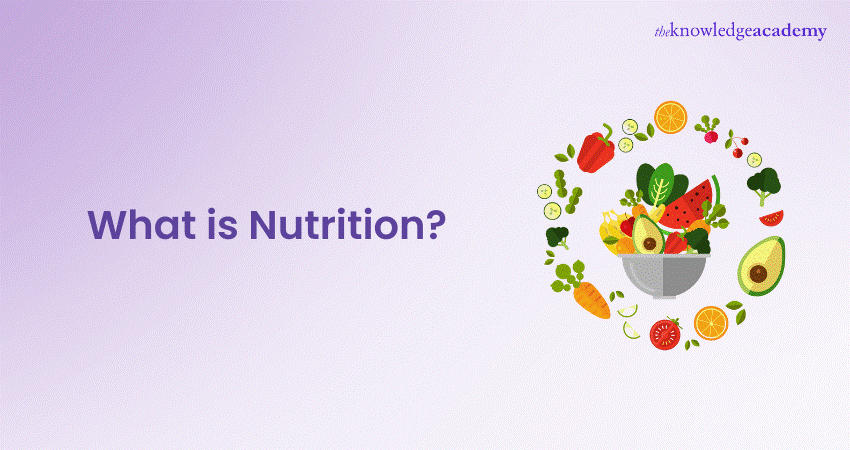
Nutrition isn’t just about what we eat; it’s the secret sauce for our well-being. Think of it as the fuel that powers our bodies, keeping us in tip-top shape. Nutrition, which plays a important role in maintaining overall health and well-being. Nutrition is an essential aspect of human life. Our food provides nutrients, which are necessary substances to our bodies that need to function properly.
In this blog, we’ll dive into the fascinating world of Nutrition and explore What is Nutrition, its components, real-world examples, and how it impacts our health.
Table of Contents
1) Understanding What is Nutrition
2) Components of Nutrition
3) The Role of Nutrition in Health
4) Factors Affecting Nutritional Choices
5) Misconceptions About Nutrition
6) Tips for a Balanced Diet
7) Conclusion
Understanding What is Nutrition
Nutrition is far more than a simple matter of satisfying hunger; it's a complex and dynamic process that fuels our bodies, impacts our health, and shapes our lives. At its core, Nutrition refers to the journey of nutrients from the plate to the intricate biochemical processes that sustain life within us. It's a symphony of interactions between food and the body, encompassing digestion, absorption, transport, and utilisation of nutrients for energy, growth, repair, and overall functionality.
Nutrition's Impact on Health
The significance of Nutrition stretches beyond mere sustenance; it's the cornerstone of good health and vitality. A balanced diet replete with a rainbow of nutrient-rich foods is a potent disease prevention and management tool. Discover the essence of well-being to uncover What is Nutrition and its impact on your health. Adequate intake of vitamins, minerals, and antioxidants supports immune function, rendering our bodies more resilient against infections and chronic illnesses.
Empowering Through Knowledge
Cultivating a fundamental understanding of Nutrition is empowering our health. It's about deciphering labels, recognising nutrient-rich choices, and appreciating the profound impact of dietary habits on our bodies and minds. By acknowledging the importance of Nutrition and its intricate interplay within our physiology, we pave the way for healthier lives, heightened energy, improved mental clarity, and longevity. Ultimately, Nutrition isn't just about what's on our plates; it's about the profound influence our choices hold over our life's narrative.
Components of Nutrition
Below are the components of Nutrition:
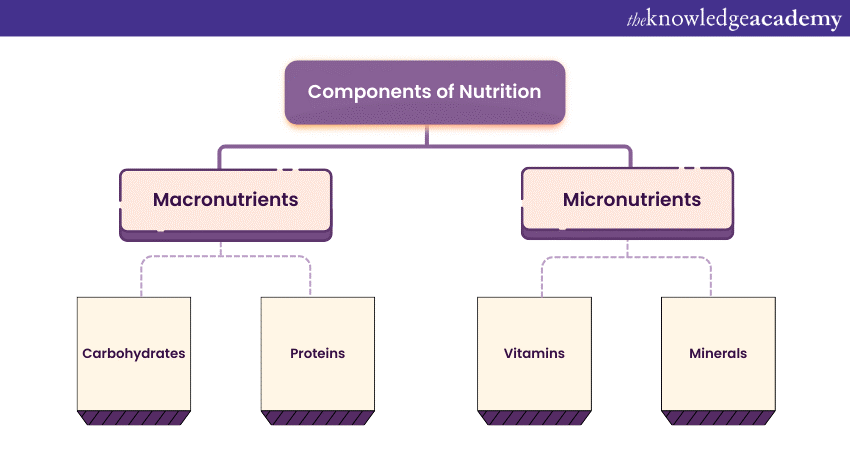
Macronutrients
Macronutrients are nutrients required in relatively large quantities, essential for various bodily functions. The primary macronutrients include carbohydrates, proteins, fats, and water.
Carbohydrates
Carbohydrates are a major energy source and include sugars, starch, and Fibre.
a) Sugars: Simple carbohydrates that are quickly broken down and absorbed by the body, providing rapid energy. However, they do not sustain fullness and can cause spikes in blood sugar levels which can increase the risk of type 2 diabetes.
b) Fibre: A type of carbohydrate that the body partly breaks down for energy. Some types are metabolised by gut bacteria, while others pass through the body. Fiber and unprocessed starches are complex carbs that take longer to digest, helping maintain fullness and reducing the risk of diabetes, colorectal cancer and cardiovascular disease
Sources: Whole grains, fruits, vegetables, beans, lentils
Proteins
Proteins consists of amino acids, which are organic compounds vital for the body's functions.
a) Essential Amino Acids: Can be obtained from food as the body cannot produce them.
b) Complete Proteins: Foods that contain all essential amino acids. Most animal-based foods are complete proteins, while most plant-based foods are not. Vegans need to consume a variety of foods to get all essential amino acids.
Sources: Meat, fish, dairy, eggs, beans, lentils, tofu, nuts
Fats
Fats are necessary for:
a) Lubricating joints
b) Hormone production
c) Absorbing certain vitamins
d) Reducing inflammation
e) Preserving brain health
The type of fat consumed matters:
a) Unsaturated Fats: Healthier fats are found in olive oil, nuts, and avocados.
b) Saturated Fats: Typically found in animal products, excessive consumption can lead to health issues.
Sources: Olive oil, avocados, nuts, seeds, fatty fish
Water
Water is crucial for many bodily processes, and the adult human body is up to 60% water. It does not provide energy but is essential for hydration.
a) Hydration Recommendations: Generally, 2 litres (8 glasses) of water per day is recommended, but it can vary based on factors like body size, age, activity levels, and environmental conditions.
b) Dietary Sources: Water can also be obtained from fruits and vegetables.
Sources: Water, fruits, vegetables
|
Macronutrient |
Function |
Recommended Daily Amount |
Sources |
Effects of Deficiency |
Effects of ExcessEffects of Excess |
|
Carbohydrates |
Energy source, supports bodily functions |
Varies based on individual needs |
Whole grains, fruits, vegetables, beans, lentils |
Low energy, poor digestive health |
Weight gain, increased risk of diabetes |
|
Proteins |
Builds and repairs tissues, supports immune function |
Varies based on individual needs |
Meat, fish, dairy, eggs, beans, tofu, nuts |
Muscle loss, weakened immunity |
Kidney damage, digestive issues |
|
Fats |
Lubricates joints, hormone production, vitamin absorption |
20-35% of daily calories |
Olive oil, avocados, nuts, seeds, fatty fish |
Hormonal imbalances, vitamin deficiencies |
Obesity, high cholesterol, liver disease |
|
Water |
Hydration, supports bodily functions |
2 litres or more |
Water, fruits, vegetables |
Dehydration, kidney stones |
Overhydration (rare) |
Achieve your wellness goals! Engage with our Healthy Lifestyles Training and unlock the potential for a healthier, happier you.
Micronutrients
Micronutrients are vital in small quantities, including vitamins and minerals. Manufacturers sometimes fortify foods with these nutrients, such as cereals and rice.
Minerals
The body requires carbon, hydrogen, oxygen, and nitrogen, along with dietary minerals like iron and potassium. A varied and balanced diet typically provides necessary minerals, but supplements may be recommended if deficiencies occur.
Here are some essential minerals and their functions:
|
Mineral |
Function |
Recommended Daily Amount |
Sources |
Effects of Deficiency |
Effects of Excess |
|
Potassium |
Electrolyte that supports kidney, heart, muscle, and nerve function |
4,700 mg |
Avocados, bananas, beans, lentils, dried fruit |
High blood pressure, stroke, kidney stones |
Harmful for those with kidney disease |
|
Sodium |
Maintains nerve and muscle function, regulates fluid levels |
≤2,300 mg |
Table salt, naturally in foods |
Hyponatremia (lethargy, confusion, fatigue) |
High blood pressure, cardiovascular disease |
|
Calcium |
Bone and teeth formation, supports nervous system and cardiovascular health |
1,000-1,200 mg |
Dairy products, tofu, legumes, leafy greens |
Weak bones and teeth, heart rhythm changes |
Constipation, kidney stones |
|
Phosphorus |
Bone and teeth health, energy production |
700 mg |
Dairy, salmon, lentils, cashews |
Bone diseases, muscle weakness, Anaemia |
Unlikely from diet, possible toxicity from supplements |
|
Magnesium |
Muscle and nerve function, blood pressure regulation, DNA production |
320-420 mg |
Nuts, spinach, beans |
Weakness, nausea, restless legs |
Digestive and heart problems |
|
Zinc |
Immune system, wound healing, protein creation |
8-11 mg |
Oysters, beef, fortified cereals |
Hair loss, skin sores, taste/smell changes |
Digestive problems, headaches |
|
Iron |
Red blood cell formation, oxygen transport |
8-18 mg |
Fortified cereals, beef liver, lentils, spinach |
Anaemia, weakness, digestive issues |
Digestive problems, potentially fatal at high levels |
|
Manganese |
Energy production, blood clotting, immune support |
1.8-2.3 mg |
Mussels, hazelnuts, brown rice, chickpeas |
Weak bones, skin rashes, mood changes |
Tremors, muscle spasms |
|
Copper |
Energy production, connective tissues, blood vessels |
900 mcg |
Beef liver, oysters, potatoes, mushrooms |
Tiredness, high cholesterol, light skin patches |
Liver damage, abdominal pain |
|
Selenium |
Reproductive and thyroid health, antioxidant |
55 mcg |
Brazil nuts, spinach, tuna, enriched macaroni |
Heart disease, male infertility, arthritis |
Garlic breath, skin rashes, brittle hair/nails |
Energize your life! Dive into our Active and Healthy Lifestyles Training and discover ways to incorporate fitness into your routine.
Vitamins
Vitamins are essential in small amounts, some of which act as antioxidants, protecting cells from damage by removing free radicals.
Water-Soluble Vitamins:
|
Vitamin |
Deficiency Effects |
Excess Effects |
Sources |
|
B-1 (Thiamine) |
Beriberi, Wernicke-Korsakoff syndrome |
Unclear |
Fortified cereals, pork, black beans |
|
B-2 (Riboflavin) |
Hormonal problems, skin disorders |
Unclear |
Beef liver, oats, yoghurt |
|
B-3 (Niacin) |
Pellagra, digestive and neurological symptoms |
Flushing, itching, headaches |
Beef liver, chicken breast, peanuts |
|
B-5 (Pantothenic Acid) |
Numbness, fatigue, stomach pain |
Digestive problems |
Breakfast cereal, shiitake mushroom |
|
B-6 (Pyridoxine) |
Anaemia, skin changes, swollen tongue |
Nerve damage, muscle control loss |
Chickpeas, tuna, potatoes |
|
B-7 (Biotin) |
Hair loss, rashes, conjunctivitis |
Unclear |
Beef liver, eggs, salmon |
|
B-9 (Folate) |
Hair loss, rashes, conjunctivitis |
Increased cancer risk |
Spinach, black-eyed peas, asparagus |
|
B-12 (Cobalamins) |
Anaemia, fatigue, weight loss |
None reported |
Clams, fortified yeasts, oily fish |
|
Vitamin C |
Scurvy, poor wound healing |
Nausea, diarrhoea, stomach cramps |
Citrus fruits, berries, broccoli |
Fat-Soluble Vitamins:
|
Vitamin |
Deficiency Effects |
Excess Effects |
Sources |
|
Vitamin A |
Night blindness |
Brain pressure, dizziness, skin irritation |
Sweet potato, spinach, carrots |
|
Vitamin D |
Poor bone formation |
Anorexia, heart rhythm changes |
Sunlight, cod liver oil, oily fish |
|
Vitamin E |
Peripheral neuropathy |
Reduced blood clotting |
Wheatgerm, nuts, seeds |
|
Vitamin K |
Bleeding, haemorrhaging |
May interact with blood thinners |
Leafy greens, soybeans, okra |
Antioxidants:
Antioxidants can be vitamins, minerals, proteins, or other molecules that help remove free radicals, preventing cell damage and disease.
Remember, multivitamins are available, but it's crucial to consult a doctor before starting any supplements
Fuel your body with knowledge! Explore our Nutrition Course to learn how to make informed food choices for optimal health.
The Role of Nutrition in Health
Nutrition is fundamental to our physical, mental, and emotional well-being. It empowers us to make informed dietary choices for a healthier life.
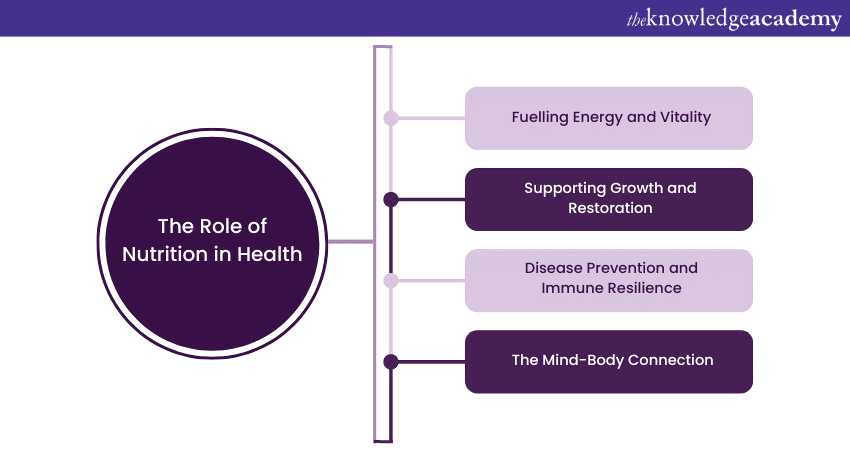
Fuelling Energy and Vitality
Macronutrients—carbohydrates, proteins, and fats—are essential for energy. Carbohydrates provide immediate energy, proteins support muscle development and biochemical reactions, and fats store energy and insulate the body.
Supporting Growth and Restoration
Proper Nutrition is important for growth and development from infancy to adulthood. It ensures bone elongation, muscle strengthening, and organ maturation. During pregnancy, it supports both mother and child, and nutrients aid in tissue repair and renewal.
Disease Prevention and Immune Resilience
Nutrient-rich foods, especially those high in vitamins, minerals, and antioxidants, protect against diseases. Antioxidants prevent cellular damage, while vitamins and minerals support the immune system, helping to fend off infections.
The Mind-Body Connection
Nutrition impacts mental and emotional health. Omega-3 fatty acids improve brain health and may alleviate depression and anxiety. B vitamins help produce neurotransmitters that regulate mood and behaviour.
Transform your health journey! Engage in our Nutrition and Fitness Training for a holistic approach to wellness and vitality.
Factors Affecting Nutritional Choices
Nutritional choices are influenced by various factors, including cultural influences, personal preferences, economics, and media exposure. Understanding these influences provides insights into our dietary decisions.
Several factors influence our dietary decisions are mentioned below:
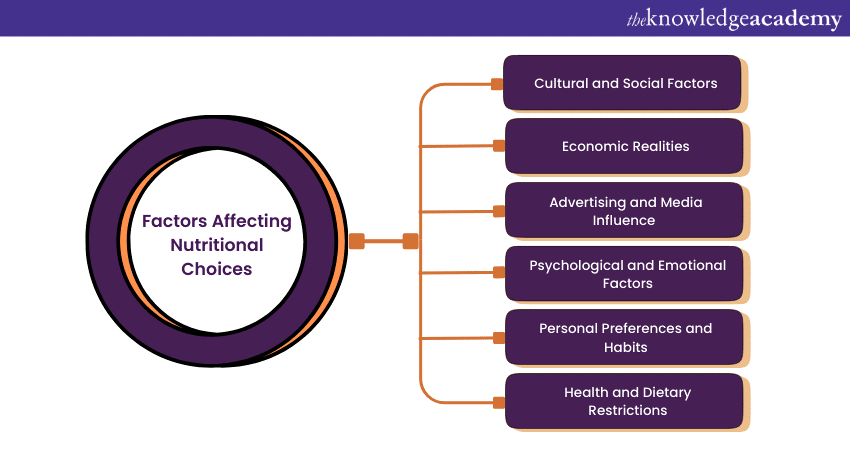
Cultural and Social Factors
Cultural heritage and social norms shape our diets through traditional dishes, culinary practices, and family recipes. Celebrations and communal meals reinforce these ties, while globalisation introduces new cuisines and lifestyles.
Economic Realities
Economic circumstances affect Nutritional choices. Affordability and accessibility determine what foods we can buy. Nutrient-dense foods like vegetables, fresh fruits, and lean proteins can be expensive, leading some to choose cheaper, calorie-dense options.
Advertising and Media Influence
Advertising and media often promote processed foods high in sugars, unhealthy fats, and sodium. These campaigns can influence us to prefer less nutritious options.
Psychological and Emotional Factors
Emotions and psychological states impact food choices. Emotional eating, driven by stress or mood, can lead to overeating or choosing comfort foods high in calories but low in nutrients.
Personal Preferences and Habits
Individual tastes and habits, formed in childhood and carried into adulthood, play a significant role in dietary patterns. Preferences for certain tastes, textures, and personal associations influence our choices.
Health and Dietary Restrictions
Health concerns and dietary restrictions, such as allergies, diabetes, and specific diets (e.g., vegetarianism), affect Nutritional decisions. Health goals like weight management or muscle gain also drive dietary choices.
Misconceptions About Nutrition
Navigating Nutrition can be confusing due to evolving science and prevailing misconceptions. Here are some common myths debunked:
All Fats Are Bad
Not all fats are harmful. Unsaturated fats, found in nuts, avocados, and olive oil, are beneficial for heart health, brain function, and overall well-being. These fats, including omega-6 and omega-3 fatty acids, support cell membranes and hormone production.
Skipping Meals for Weight Loss
Skipping meals can alter metabolism and lead to overeating later. Irregular eating patterns can cause muscle loss and decreased energy levels. Focusing on portion control and nutrient-dense foods is a better approach to weight management.
Carbs Are Always Bad
Not all carbs are detrimental. Complex carbs in vegetables, whole grains, and fruits provide sustained energy, support digestion, and promote fullness. Choosing minimally processed; high-fibre carbs is key.
The Power of Nutritional Education
Debunking these misconceptions requires a solid understanding of Nutrition. Knowledge about macronutrients, micronutrients, and metabolic processes empowers informed choices. Consulting dietitians and reputable sources can help separate fact from fiction, guiding healthier dietary practices.
Elevate your well-being with Yoga, sign up for our Yoga Course now!
Tips for a Balanced Diet
Maintaining a balanced diet isn't a simple task. It's a cornerstone of well-being that empowers us to harness the full potential of our bodies. Here are some essential tips to guide you toward a diet that fosters health and vitality:
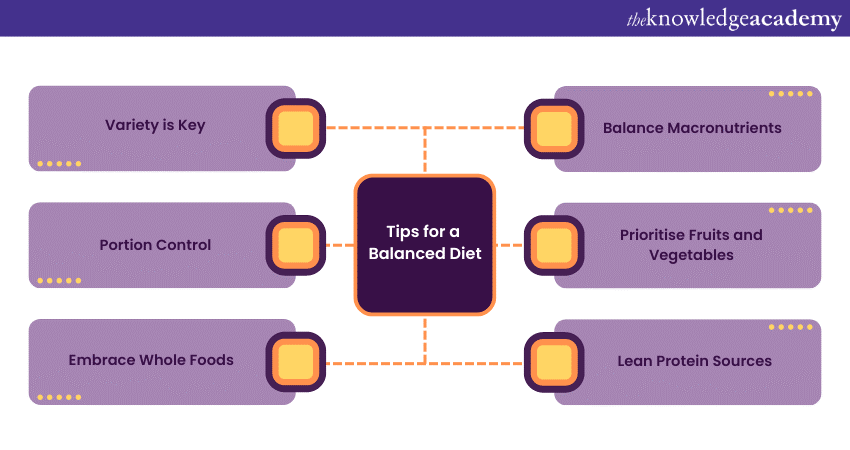
a) Variety is Key: Incorporate a diverse list of foods into your meals. Different foods offer a variety of Nutrients that collectively support your body's needs.
b) Portion Control: Be mindful of portion sizes. Overeating, even healthy foods, may cause excess calorie intake, which can lead to gain more weight.
c) Embrace Whole Foods: Choose whole, minimally processed foods whenever possible. These foods retain their natural nutrients and fibre content.
d) Balance Macronutrients: Include a mix of proteins, carbohydrates, and fats in your diet. These macronutrients work together to provide energy, support growth, and maintain bodily functions
e) Prioritise Fruits and Vegetables: Aim to fill half your plate with colourful fruits and vegetables. They're rich in vitamins, minerals, and antioxidants.
f) Lean Protein Sources: There is a variety of options for lean protein sources like poultry, fish, beans, and legumes. Protein supports muscle health, immune function, and tissue repair.
g) Choose Whole Grains: Brown rice, quinoa, and whole wheat are the options for whole grains. They provide more fibre and nutrients compared to refined grains.
h) Healthy Fats: Include sources of healthy fats, such as avocados, nuts, seeds, and olive oil. These fats are necessary for brain health and overall well-being.
i) Limit Added Sugars and Salt: Reduce your intake of foods and beverages that are highly rich in sugars and sodium. These can contribute to various health issues.
j) Stay Hydrated: To stay hydrated, drink plenty of water throughout the day. Hydration is vital for digestion, metabolism, and overall bodily functions.
k) Plan Ahead: To make healthier choices and avoid impulsive, less nutritious options, plan your meals and snacks in advance.
l) Listen to Your Body: Pay attention to your body's hunger and fullness cues. Awareness of eating helps prevent overeating.
Conclusion
Nutrition is the foundation of a healthy life. Understanding What is Nutrition, components, and role in health empowers us to make proper dietary choices. We can pave the way for a vibrant and nourished life by embracing a balanced diet and dispelling common misconceptions. Remember, every bite you take is a step toward a healthier you.
Transform lives, including your own, with our Life Coach, sign up for our Life Coach Course now!
Frequently Asked Questions

Nutrition is important for overall health as it fuels bodily functions, supports growth and repair, and boosts immune resilience. A balanced diet rich in necesssary nutrients helps prevent diseases and enhances mental and emotional well-being.

Macronutrients, including carbohydrates, proteins, and fats, are required in large amounts for energy and bodily functions. Micronutrients, like minerals and vitamins, are needed in smaller quantities but are vital for metabolic processes, immune function, and disease prevention.

The Knowledge Academy takes global learning to new heights, offering over 30,000 online courses across 490+ locations in 220 countries. This expansive reach ensures accessibility and convenience for learners worldwide.
Alongside our diverse Online Course Catalogue, encompassing 17 major categories, we go the extra mile by providing a plethora of free educational Online Resources like News updates, Blogs, videos, webinars, and interview questions. Tailoring learning experiences further, professionals can maximise value with customisable Course Bundles of TKA.

The Knowledge Academy’s Knowledge Pass, a prepaid voucher, adds another layer of flexibility, allowing course bookings over a 12-month period. Join us on a journey where education knows no bounds.

The Knowledge Academy offers various Healthy Lifestyles Training, including the Active and Healthy Lifestyles Training, Nutrition Course, and Nutrition and Fitness Training. These courses cater to different skill levels, providing comprehensive insights into 5 Ways to WellBeing.
Our Health & Safety Blogs cover a range of topics related to Nutrition, offering valuable resources, best practices, and industry insights. Whether you are a beginner or looking to advance your Healthy Lifestyle skills, The Knowledge Academy's diverse courses and informative blogs have got you covered.







 Top Rated Course
Top Rated Course




 If you wish to make any changes to your course, please
If you wish to make any changes to your course, please


